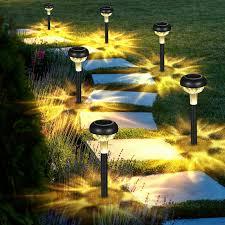Outdoor Lighting Market LED Innovations

The outdoor lighting market is being dramatically reshaped by cutting-edge LED innovations. These advancements are driving improvements in energy efficiency, smart controls, design flexibility, and sustainability—transforming how municipalities, businesses, and homeowners illuminate exterior spaces.
1. High-Efficiency & High-Performance LEDs
One of the most impactful breakthroughs in LED technology has been the leap in luminous efficacy—the amount of light produced per watt of energy consumed. Modern LEDs now deliver significantly more lumens while consuming much less power, making streetlights, sports arenas, and parking lots vastly more energy-efficient. Improved driver circuits and optimized thermal management systems ensure consistent illumination across temperature fluctuations and longer fixture lifespans.
2. Intelligent & Adaptive Lighting Controls
LEDs are increasingly being paired with smart control systems—eliminating waste and elevating efficiency. Sensors detect ambient light, pedestrian or vehicular activity, and adjust brightness accordingly. Advanced controls enable scheduled dimming, remote diagnostics, and networked orchestration across multiple zones. Real-time feedback loops allow maintenance teams to identify failures instantly, reducing downtime and boosting safety.
3. Tunable Color and Dynamic Ambience
LED lighting is no longer limited to static white tones. Innovations such as tunable white (2700K–6500K) and full-color RGBW LEDs allow color temperature and hue adjustment via app interfaces or automation systems. Municipally managed public plazas, residential facades, or landmark architecture can shift between functional illumination and dynamic visual storytelling—setting mood, highlighting events, and infusing creativity into outdoor spaces.
4. Laser-Enhanced LEDs & Long-Distance Modules
Emerging laser-assisted and long-distance LED modules are unlocking new possibilities in architectural and infrastructural lighting. These technologies focus light in precise beams over long distances, offering ultra-bright, energy-efficient solutions ideal for stadiums, bridge highlights, and tall building façades. Their intensity, combined with minimal energy draw, makes large-scale lighting projects more sustainable without compromising visual impact.
5. Modular & Scalable Architecture
LED advancements now enable modular fixture design, where lighting systems can be expanded, repaired, or upgraded effortlessly—without replacing entire units. This plug-and-play architecture favors phased rollouts and budget-aware upgrades. Integrated power and communication modules—like edge-mounted sensors or control nodes—add flexibility for zones requiring upgrades or reconfiguration.
6. Integrated Renewable Solutions
Eco-conscious design is steering LED innovation toward solar-integrated and hybrid lighting systems. These fixtures house solar panels, battery storage, and optimized controllers for LED operation—all working autonomously. Now, functional lighting can be deployed in remote, off-grid locations—parks, pathways, and rural corridors—without reliance on traditional power infrastructure.
7. Durability & Environmental Resistance
Outdoor LEDs are increasingly engineered with ruggedized features such as high ingress protection (IP ratings), corrosion-resistant materials, and shock-proof housings. Some fixtures are built to withstand extreme temperatures, heavy vibration (e.g., along highways or rail tracks), and harsh coastal environments. Longevity and reliability help reduce maintenance costs and justify premium upfront investments.
8. Emergency, Safety, & Backup Capabilities
Modern LEDs are being integrated with backup power systems and emergency protocols. In the event of power failure, some fixtures seamlessly switch to battery modes or connect to microgrid networks, providing reliable fallback lighting. Emergency routing, security zones, and critical exteriors benefit from such resilient illumination—especially in disaster-prone or safety-critical areas.
9. Smart Infrastructure & Analytics Integration
Many LED systems now connect to urban IoT platforms to facilitate data-driven lighting management. Cameras, environmental sensors, and networked LED arrays collaborate to optimize lighting schedules based on conditions like traffic flow, air quality, or public event requirements. Data insights help municipalities minimize energy waste, enhance safety, and plan infrastructure upgrades more efficiently.
10. Aesthetic Design and Architectural Fusion
LED design innovation isn’t just functional—it’s elevating outdoor lighting aesthetics. Slim, customizable fixtures blend into contemporary architectural styles. Accent lighting, wall-wash effects, linear profiles, and indirect illumination bring artistry to exteriors. Designers now play with shadow, contrast, and light texture—empowered by LEDs—to build immersive public and private spaces.
Final Perspectives
LED innovation is redefining the outdoor lighting market, delivering value far beyond illumination. From energy-efficient solutions to smart systems, aesthetic versatility to durable design, modern LEDs are at the heart of smarter and greener outdoor infrastructure.
By embracing these advancements—from modular upgrades and tunable ambiance to off-grid solar fixtures and analytic platforms—city planners, architects, and developers can build safer, more sustainable, and visually compelling spaces.
- Art
- Causes
- Crafts
- Dance
- Drinks
- Film
- Fitness
- Food
- Spiele
- Gardening
- Health
- Startseite
- Literature
- Music
- Networking
- Andere
- Party
- Religion
- Shopping
- Sports
- Theater
- Wellness
- IT, Cloud, Software and Technology


